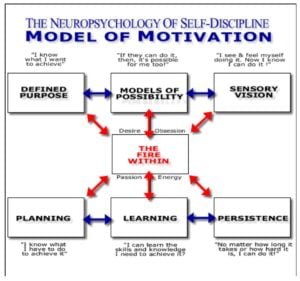Self Discipline- a seven-step process
The neuropsychology of self-discipline, seven-step process model of motivation.
‘The Neuropsychology of Self-Discipline’ is based on research conducted by author Steve DeVore, Syber Vision and Dr Karl Pribram (1986) at the Stanford University Neuropsychological Research Laboratories. The Neuropsychology of Self-Discipline will teach you a seven-step process to build the power of self-discipline and motivation into your own life.
The first three steps are motivational — they provide you with the fire, the drive, the emotional energy (the fourth step) to complete your goal. The final three steps are actionable — they detail the things that must be done for you to succeed.

self-discipline -seven-step process
1. Create a Purpose: Define exactly what you really want to accomplish. This gives you a cause, a reason for making the effort. It lights a small spark inside you that will soon begin to burn as your emotion and drive increases.
2. Find Role Models: In order to believe that you can reach your goal, it is important for you to find others who have achieved a similar goal. These models provide you with two key ingredients — the belief that your goal can be accomplished, a sense of possibility — and a template or plan you can follow. They’ve achieved it, why can’t you. This sense of possibility combined with a defined purpose further feeds our emotional fire.
3. Sensory Vision: You can vividly see yourself reaping the rewards of achieving your goal. The vision comes alive. You can see, touch, smell, and feel it. you go from “I think I can do it” to “I know I can do it.”
4. Emotion: Your vision becomes atomic in nature, every cell of your body is charged with emotion and passion. With this passion, you are now motivated to complete action steps four, five, and six.
5. Planning: You determine exactly what you need to do to reach your goal and how long it will take. This step further fuels your passion and stokes your emotional fires by turning your vision into a concrete plan.
6. Knowledge and Skills: Once you have a plan to reach your goal, you have to acquire the skills and knowledge necessary to implement the plan. You must develop the confidence that you can learn. Each time you master a skill, your confidence in your ability to succeed increases, you get closer to your goal, and the passion from which you draw your motivation energy further increases.
7. Persistence and Perseverance: Persistence is staying with your vision, seeing it through to its
completion no matter how long it takes or how difficult it is. Perseverance is persisting in spite of
physical and emotional pain, setbacks, and hardships.
As your vision fuels your efforts and your efforts bring you closer to your vision, you put
together a self-perpetuating spiral of vision, belief, emotion, and effort. When this formula is
followed, it will change your life.
Subscribe to Careershodh
Get the latest updates and insights.
Join 14,341 other subscribers!
Niwlikar, B. A. (2019, October 22). Self Discipline- seven step process. Careershodh. https://www.careershodh.com/self-discipline-seven-step-process/
